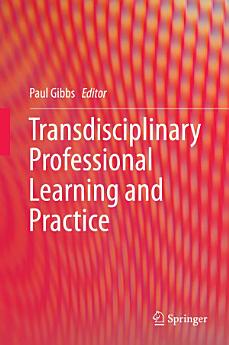Transdisciplinary Professional Learning and Practice
Paul Gibbs
জানু ২০১৫ · Springer
ই-বুক
212
পৃষ্ঠা
reportরেটিং ও রিভিউ যাচাই করা হয়নি আরও জানুন
এই ই-বুকের বিষয়ে
This book presents thinking about and through transdisciplinary and professional development as an educative process. Rather than focusing on the delineation of the approaches offered, an analysis of these contributions points to commonality in those problems that benefit from a transdisciplinary perspective. The core elements of transdisciplinarity can lead to what might be called metanoia - another way of knowing; a knowing which is ‘beyond that which is creative and transformative. This poses challenges for the practice of all professionals and is the core issue that this book addresses. The book brings together the constituting views of transdisciplinarity, or metanoia, and focus them on current professional practice. The book is structured in two parts and five sections. The first part deals with key issues in Transdisciplinarity; its actuality and how it creates knowledge. Section 1 has three original papers which look at Transdisciplinarity from a different lens. Especially, the Islamic voice has not been heard in this context before. Section 2 considers the knowledge aspect of Transdisciplinarity and how this might be confronted with existing disciplinary knowledge. Part 2 of the book is directly focused on professionals and their education. The third section considers research pedagogy and graduate education for the professional. This is followed in section 4 which offers a discussion on team work. In the final section six chapters present the transdisciplinary practitioner in different contexts.
ই-বুকে রেটিং দিন
আপনার মতামত জানান।
পঠন তথ্য
স্মার্টফোন এবং ট্যাবলেট
Android এবং iPad/iPhone এর জন্য Google Play বই অ্যাপ ইনস্টল করুন। এটি আপনার অ্যাকাউন্টের সাথে অটোমেটিক সিঙ্ক হয় ও আপনি অনলাইন বা অফলাইন যাই থাকুন না কেন আপনাকে পড়তে দেয়।
ল্যাপটপ ও কম্পিউটার
Google Play থেকে কেনা অডিওবুক আপনি কম্পিউটারের ওয়েব ব্রাউজারে শুনতে পারেন।
eReader এবং অন্যান্য ডিভাইস
Kobo eReaders-এর মতো e-ink ডিভাইসে পড়তে, আপনাকে একটি ফাইল ডাউনলোড ও আপনার ডিভাইসে ট্রান্সফার করতে হবে। ব্যবহারকারীর উদ্দেশ্যে তৈরি সহায়তা কেন্দ্রতে দেওয়া নির্দেশাবলী অনুসরণ করে যেসব eReader-এ ফাইল পড়া যাবে সেখানে ট্রান্সফার করুন।






